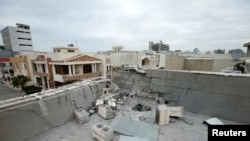Iraqi Kurds, who played a key role in the fighting against the Islamic State terror group, are now concerned about a new threat: Iranian-backed Shiite militias.
In recent weeks, the autonomous Kurdistan Region has witnessed several rocket and drone attacks targeting bases that house U.S. and foreign troops. The attacks killed at least one contractor and a Turkish soldier and wounded several others.
U.S. Secretary of State Antony Blinken called Kurdistan Regional Government (KRG) Prime Minister Masrour Barzani last week to reaffirm Washington's "commitment to the stability of Iraq and the Iraqi Kurdistan Region," according to a statement by the U.S. State Department.
"The Secretary discussed the continued attacks on Iraqi, U.S., and Coalition forces, including the April 14 attack on the Erbil International Airport," the statement said. "The Secretary and Prime Minister agreed that these attacks represent an egregious violation of Iraqi sovereignty."
'Armed to their teeth'
Despite the show of support from the U.S. and other Western governments, Kurdish residents remain worried that the heavily armed militias, collectively known as the Popular Mobilization Forces (PMF), will not be deterred.
"It is definitely no secret that Kurdistan Region will face the threat of militia forces that are largely unaccounted for and yet armed to their teeth," said Ruwayda Mustafa, a prominent Kurdish political activist.
Mustafa is concerned that the region is incapable of defending itself because it lacks a unified security force.
"What the Kurdistan Region needs for survival necessitates political will from the two main parties to think of the journey ahead, not the politics of the day, and to unify peshmerga forces outside of their political party parameters," she added.
The Kurdistan region is ruled by the Kurdistan Democratic Party (KDP) and the Patriotic Union of Kurdistan (PUK). Despite participating in a unified government, both parties have separate peshmerga forces.
Two attacks
On April 14, two separate attacks targeted the regional capital of Erbil. The first one included an explosive-laden drone that hit the Erbil International Airport. Though it left no casualties, the attack marked the first time the militias used a drone to attack Erbil.
"Indeed, the acquisition of drones by armed non-state actors in the immediate vicinity of the Kurdistan Region constitutes a major problem," said Dlawer Ala'Aldeen, president of the Erbil-based Middle East Research Institute.
"The KRG can neither defend itself against aerial attacks nor rely on Baghdad to bring the militias under control," he told VOA in an email.
The other attack targeted a Turkish base, killing a Turkish soldier and increasing fears of escalating the conflict into a regional one.
Though Turkey has not responded militarily to the attack, tensions remain high after Turkey sent more ground troops into Iraq last week to confront Kurdish militants affiliated with the Turkey-based Kurdistan Workers Party.
Shiite militias have stated that their primary goal is to expel the U.S. and its allied troops from the country.
In contrast to its responses to previous attacks, the KRG has not directly named any specific group for the April 14 attacks.
"Any armed group that is not operating under the authority of official Iraqi security forces must withdraw immediately from the Kurdistan Region's border," Barzani said in a statement following the attacks.
In February, more than a dozen rockets targeted Erbil, killing one contractor working for the U.S.-led coalition at the Erbil airport and wounding five more coalition personnel. One of the rockets landed in a residential area, injuring at least two civilians.
The KRG was quick to accuse Kataib Sayyid al-Shuhada, which is part of the PMF, of being behind the attack. It even published a video confession of an alleged perpetrator who said the rockets he used were Iranian made.
U.S. response
Experts say the U.S. government has exercised restraint in its efforts to rein in Iranian proxy groups in Iraq.
Following the February attack, Washington retaliated by striking bases used by an Iranian proxy group in Syria rather than Iraq.
"The operation sends an unambiguous message: President (Joe) Biden will act to protect American and coalition personnel," said Pentagon spokesman John Kirby in a statement following the U.S. airstrikes.
Two days after the April 14 drone attack, the U.S. and four European countries issued a joint statement to condemn the attack. But to prevent further attacks, Ala'Aldeen, the Erbil-based analyst, said it takes more than strong words.
"The joint statement was welcomed by the Iraqi Kurdish leaders," he said, "but it did very little to reassure everyone else. Condemnations without action can only encourage the attacker to do more without fearing consequences."




